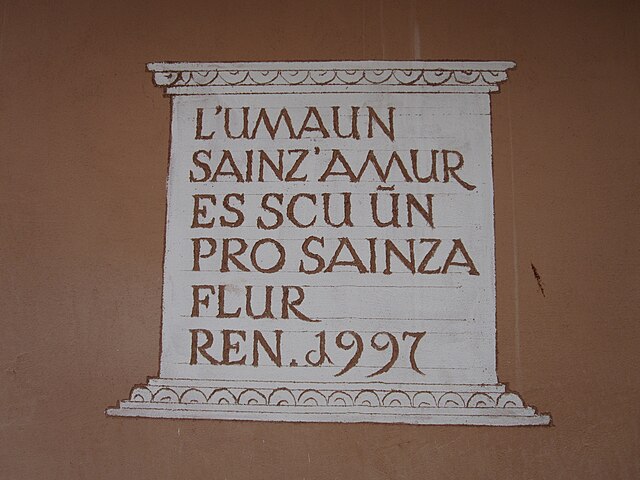Top Qs
Timeline
Chat
Perspective
Putèr
Southeastern variety of the Romansh language From Wikipedia, the free encyclopedia
Remove ads
Puter (also spelled Putèr; Romansh: puter [puˈteːr] ⓘ) is a variety of Romansh spoken in the Engadin valley in Graubünden, which is in the southeastern part of Switzerland. It is spoken in the central northwestern end of the valley between S-chanf and St. Moritz, as well as in the region of the Bernina Pass. Romansh was named by 5,497 people within the upper Engadine valley (30%) as a habitually spoken language in the census of 2000, which probably corresponds roughly to the total number of speakers.[3] The term is probably originally a nickname derived from put 'porridge', meaning 'porridge-eaters'.[4]

Remove ads
Classification
Summarize
Perspective

Sursilvan
Tuatschin
Sutsilvan
Surmiran
Putèr
Vallader
Jauer
Puter and Vallader are sometimes referred to as one specific variety known as Ladin, as they have retained this word to mean Romansh. However, the term Ladin is primarily associated with the closely related language in Italy's Dolomite mountains also known as Ladin. Puter and Vallader are distinguished from the other Romansh dialects among other things by the retention of the rounded front vowels /y/ and /ø/ (written ü and ö), which have been derounded to /i/ and /e/ in the other dialects. Compare Putèr ⓘ to Sursilvan ⓘ ‘wall’ and Putèr ⓘ to Sursilvan ⓘ 'cheese'.
Each village between S-chanf and St. Moritz has a slightly different accent, although the written form remains the same.
Remove ads
Literary development
Gian Travers wrote the first surviving work in Romansh, the Chianzun dalla guerra dagl Chiaste da Müs, in the Putèr dialect. This epic poem, written in 1527, describes the first Musso war, in which Travers himself had taken part.[5]
There is an individual dictionary for this dialect,[6] as well as texts dealing with its grammar.[7]
Sample
Summarize
Perspective
The fable The Fox and the Crow by Jean de La Fontaine in Putèr Romansh, as well as a translation into English, the similar-looking but noticeably different-sounding dialect Vallader, and Rumantsch Grischun.[8]
References
External links
Wikiwand - on
Seamless Wikipedia browsing. On steroids.
Remove ads
